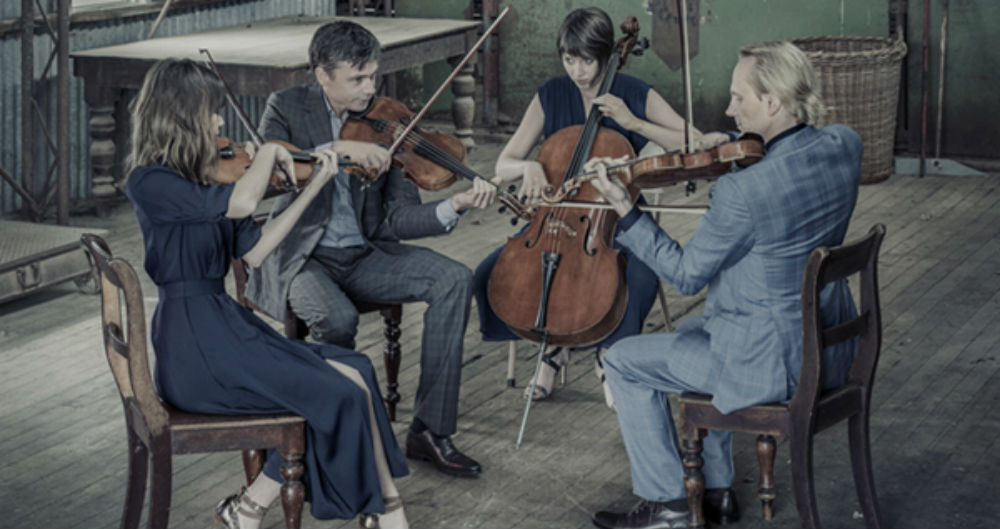Adelaide Town Hall, Thu 7 Jul
Perhaps the most admirable quality of the Australian String Quartet is their commitment to challenging themselves and their audience, a trait at the very heart of the Tempesta program, which the ASQ performed to a stunned Adelaide Town Hall audience. Uniformly clad in black, violinists Dale Barltrop, Francesca Hiew, violist Stephen King, and cellist Sharon Draper strode onto the stage to applause, before King gave a brief introduction to the evening’s opening program, discussing Anton von Webern’s Fünf Sätze for String Quartet op 5, noting its brevity and romanticism.
The Webern opened with a jolt, requiring the quartet to explore most of their instruments’ playing capabilities in the opening measure, with a bowed note leading to a pizzicato, followed by percussive bow strikes. From there the opening movement alternated between lilting melodies interspersed with quick plucking, ending just as most movements might begin picking up steam. The slower, more reserved second movement featured King’s viola before Hiew’s violin took over its haunting melody. The third found Barltrop’s violin featured against the other three’s plucks, leading to a frenzied finish only moments after it began. The fourth was another slow, soft movement, and the fifth opened on Draper’s ominous cello line before painstakingly building its crescendo only to drop again, receding to a whispered close.
Haydn’s String Quartet in C major op 20 was a warm embrace by comparison, and the ASQ bowed passion and care into its opening Moderato movement, its classical strains signifying the evening’s crowd-pleaser. The second movement Adagio’s dramatic open led to a feature for Dale Barltrop’s violin I, and the third’s revolving figure Minuetto again laid a foundation for the violin to solo over, eventually falling away entirely, before the quartet aggressively launched the Allegretto section. After closing strongly with the spritely fourth and final movement, the audience responded enthusiastically, bringing the ASQ back for additional bows before retiring for a brief interval.
Upon the concert’s resumption, the quartet launched straight into the evening’s namesake, Joe Chindamo’s Tempesta for String Quartet, its opening syncopated staccato announcing the modern adventure to ensue, moving from fleet-footed melodic sections to slower, more expansive passages. Throughout, the piece maintained a reverence for melody that is often missed in contemporary compositions. The third movement Frenzy is entirely pizzicato, and ended so sharply that the audience fought the urge to applaud, an urge that they were able to indulge fully at the abrupt close to the fourth, Flight.
Watching the quartet, it’s interesting to note the way Stephen King’s occasionally exaggerated follow-through stands in stark contrast to the relative economy of motion expended by the violinists. Sharon Draper plays cello on a platform now so that her eyes are level with the other, standing musicians while she is seated. Throughout the evening the level of difficulty ranges from high to extreme, not that one would know it from the execution. It’s easy to accept the ASQ on its own terms as a fantastic performing ensemble, but to contemplate the extent of the preparation that must go into their individual proficiency before considering the work necessitated to flawlessly deliver the very difficult Tempesta program as a group is to stare into an abyss of sustained effort, distilled into this wonderful performance.
Francesca Hiew stepped forward to introduce Felix Mendelssohn’s String Quartet in F minor op 80, explaining that it was written not long after the composer suffered the death of his beloved sister, a loss that would haunt him through the final six months of his life. As the Town Hall’s organ pipes were bathed in icy blue light, the quartet attacked the furious first movement with abandon, coming to a close so strong that some in the audience could not resist the urge to applaud. The second movement, with its deep and urgent melody that somehow always resolved to a light, whimsical turn, played like an exercise in futility. The third movement is gorgeous, if mournful, and the performers wrung the most of every note as it took its elegiac toll before allowing a brief glimpse of optimism towards the end. The final movement found the quartet moving from call and response to sharp stabs of dissonance. Late in the piece, a descending line changed hands from Barltrop’s violin to Draper’s cello, landing magnificently. The quartet built the finale, accelerating and intensifying the delivery with each measure. As the final note rang out, Draper pumped her fist, fitting for a close that hit the audience firmly in the gut. Stunned, but appreciative, the Town Hall audience erupted in applause, bringing the ASQ back again and again for bows, before staggering out into the cold winter night.
Matthew Saunders
The Clothesline Rating...
Matt Saunders
A stunning night of music from the ASQ




